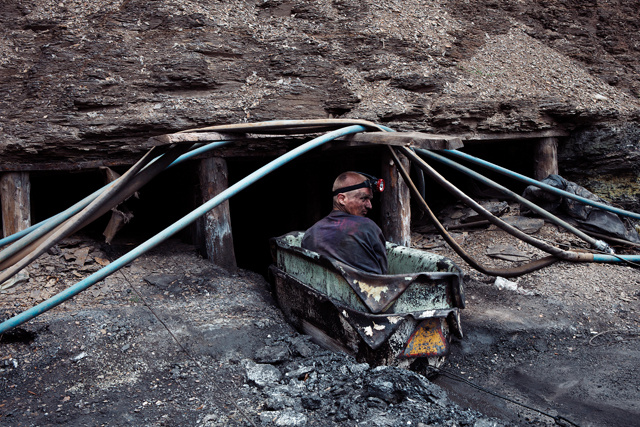Photos by Valeriya MyronenkoIt’s Monday morning and you’re savoring the last drag of your breakfast cigarette before heading off to your job as an underpaid, overworked miner, digging coal that no one needs in a town that no one’s heard of. You spend the day hacking away inside a pitch-black, kilometer-deep tar hole, breathing in exposed coal and methane. From there, you head home to an apartment smaller than a bachelor's studio with two kids, no running water and nothing to watch but reruns of old Soviet films. That’s life in Donbas, home to the most loyal supporters of Vladimir Putin and Viktor Yanukovich in modern-day eastern Ukraine.
Advertisement

After the collapse of the Soviet Union in 1991, Ukraine lagged behind the rest of the former members, using natural resources as a method to sustain jobs. But even then, the limited growth in industrial technology and predominant oligarchy kept the country from rising above the ascending devastation and poverty. For this, the people of Donbas blame Ukraine's insistence on remaining independent.Before the separation, all coal mining projects (one of the nation's main exports) operated under the Communist Party. Since then, illegal mining has become the most convenient way for the people of Donbas to dodge taxes and increase profits. However, this comes at a price: The illegal mines are often operated by strands of Ukrainian gangs, so miners are forced to work with dated, makeshift machinery and endure many hours amidst coal dust and methane without adequate protection from exposed chemicals. Working conditions like these are often part of a typical workday, and in eastern Ukraine, it doesn’t seem to be getting any better.The scars of failed Communism can still be found throughout Donbas in the form of its people. Those who work in illegal coal mines and chemical plants, wearing the same uniforms their grandfathers did, long for a reunion with Russia. To them, the Soviet Union represented a quality of life that is unattainable in an independent Ukraine; a life safe from uncertainty and risks. To this day, Russian propaganda fills the spaces between the tight walls of every Donbas household. It persuades them to adopt a lifestyle that caters to the Soviet mentality. But the closer they get to Russian campaigns, the more distant they become from the rest of the nation.
Advertisement
Toronto-based photographer Valeriya Myronenko documents critical working and living conditions for both government and illegal workers in Donbas. Her journey starts from inside coal mines and extends into the world of people whose lives continue to be governed by the ruins of Soviet times.